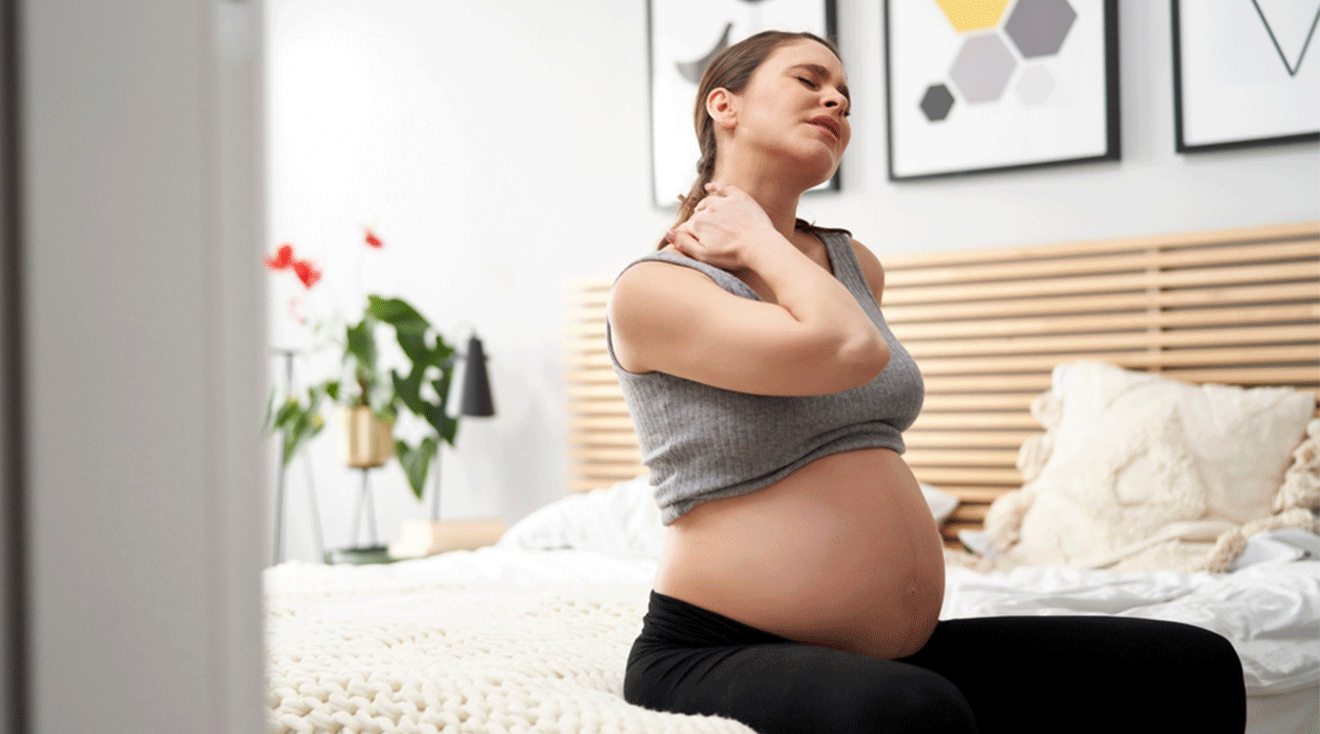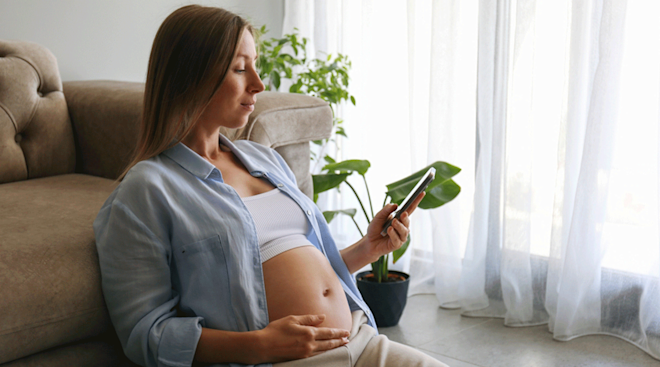How to Get Relief From a Nagging Neck Ache in Pregnancy
Aches and pangs are inevitable during pregnancy; you’re far from alone if you feel more uncomfortable than not most of the time. One common complaint among pregnant people: neck pain during pregnancy. But you don’t have to suffer through it. You can find relief from a neck ache in pregnancy with a few lifestyle changes and some at-home remedies. Read on to get tips from experts.
Neck pain is a fairly common issue during pregnancy. In fact, research shows that 20 percent of pregnant women report experiencing neck pain. You can blame all the different physical and hormonal changes your body is going through for this sudden “pain in the neck.”
Really, neck pain in pregnancy can start at any point during pregnancy, but you might notice extra discomfort in the later stages of the journey, says Tori Hartline, DC, MS, a board-certified prenatal and pediatric chiropractor and owner at Sunlife Chiropractic in Frisco, Texas.
A neck ache in pregnancy can be caused by several things—and the pain isn’t created equal. Different levels of pain can correlate with unique causes of discomfort. Ready to find out? Here’s what might be causing your neck pain:
Posture changes
For starters, your body changes to adjust to your growing belly and the added weight of baby, explains Mariam Aboulela, MD, a board-certified ob-gyn affiliated with Memorial Hermann Health System at the Sugar Land Campus in Texas. Essentially, you have a new center of gravity that your body needs to get used to. In turn, this can cause extra strain on the neck as the spine curves in a new way.
Hormones
With pregnancy comes an increase of new hormones. Relaxin, in particular, might be causing issues. Its primary function is to loosen your ligaments to prepare the body for birth. So when the relaxin hormone starts circulating throughout your body, joints and ligaments can become less stable—or relaxed— leading to more discomfort in the neck, says Hartline.
Sleep issues
Tossing and turning all night—something that many pregnant women can relate to—can majorly affect your body. Waking up with neck strain and stiffness from a sleepless night is all too common, especially in the later half of pregnancy.
Stress
Not only can pregnancy be physically demanding, it can also be emotionally draining. And because stress typically manifests itself as muscle tension in the neck and shoulders, it’s common to experience a neck ache in pregnancy, says Hartline. In fact, recent research shows that psychological distress can indeed worsen neck pain.
Nutritional demands
If your body isn’t properly nourished, you’re at further risk for neck strain while pregnant. In addition to having loose ligaments, extra weight and a new center of gravity, your body also sends its core nutrients to baby. “Baby will be prioritized, and you get what’s left,” says Tara Pierce, DC, LAc, board-certified doctor of chiropractic, licensed acupuncturist and owner of OC Well Studio in Newport Beach, California. When you don’t get enough nutrients daily, your entire body–including your spine and neck–can be further strained.
Lifestyle factors
Ever heard of tech neck? It’s true that normal daily activities like hunching over your computer or staring down at your phone also lead to neck pain and poor posture, adds Aboulela.
Firstly, remember that pregnancy is a lot of work. You’ll experience all sorts of aches, pains and sensations that aren’t necessarily fun. Thankfully, there are many things you can do to reduce the discomfort.
Seek chiropractic care
Gentle adjustments from a chiropractor trained in prenatal care may be helpful. Hartline says it can align your spine, relieve pressure, relax muscles and decrease stress.
Try prenatal massage
Prenatal massage therapy can relieve muscle aches and joint pains, according to the American Pregnancy Association. Massaging in a certain area improves circulation and gently releases tension. Keep in mind, though, when looking for a masseuse, it’s best to find one that’s certified in prenatal massage therapy. This way, they’ll know exactly how to address your pregnancy concerns.
Get movement
Remain active during pregnancy by doing stretches, practicing prenatal yoga and exercising can be incredibly valuable. “Staying strong helps stabilize lax joints as hormone changes occur,” says Pierce. Schedule some time to move each day, no matter what that looks like to you–any movement is better than no movement.
Practice your posture
Being mindful of your posture can drastically improve neck pain. Pull your shoulders and chin back from a slouching position throughout the day, advises Aboulela. The goal is to try and align your spine, whether you’re standing or sitting.
Use supportive pillows
Hartline notes that pregnancy-safe, supportive pillows can be great for helping improve sleep posture too. Essentially, when you sleep with a pillow properly supporting your neck and back, you can wake up better refreshed with a not-so-tight body.
Try hot and cold therapy
Ice reduces inflammation in the body. On the flip side, heat relaxes stiff muscles. Alternating between hot and cold therapy (20 minutes each) can help with neck pain in pregnancy, says Hartline.
Ask about magnesium supplementation
Hartline suggests asking your doctor if you can try a magnesium supplement. Studies show that magnesium helps inhibit the body’s NMDA receptors, which play a significant role in pain. You can also try magnesium flakes in a nice warm bath or applied to your neck as a lotion.
The good news: You can be proactive about neck pain. “Staying as active as possible during pregnancy is everything,” says Pierce. If your doctor hasn’t given you any specific activity restrictions, it’s generally safe to carry on as you had before pregnancy, she adds.
Here are some other ways prevent neck pain while pregnant, according to Aboulela:
- Practice good posture
- Use supportive pillows when sleeping
- Stay hydrated
- Take regular breaks from work
- Stretch daily
While some neck pain is par for the course, watch for neck stiffness, headache, fevers, and/or tingling and numbness down your arms; these could point to a more serious condition and warrant a call to your doctor, says Aboulela. Moreover, if the pain worsens, flag it—it’s best to play it safe.
Please note: The Bump and the materials and information it contains are not intended to, and do not constitute, medical or other health advice or diagnosis and should not be used as such. You should always consult with a qualified physician or health professional about your specific circumstances.
Plus, more from The Bump:
Tori Hartline, DC, MS, is a board-certified prenatal and pediatric chiropractor and the owner at Sunlife Chiropractic in Frisco, Texas. She is Webster-certified and passionate about working with women, children and families.
Tara Pierce, DC, LAc, is a board-certified doctor of chiropractic, licensed acupuncturist and the owner of OC Well Studio in Newport Beach, California. She earned her degree at Southern California University of Health Sciences.
Mariam Aboulela, MD, is a board-certified ob-gyn affiliated with Memorial Hermann Health System at the Sugar Land Campus in Texas. She earned her medical degree from the Florida State University College of Medicine in Tallahassee, Florida.
Cureus, The Association Between Neck Pain and Psychological Distress Experienced by King Abdulaziz University Students: A Cross-Sectional Study, March 2023
American Pregnancy Association, Prenatal Massage Therapy
Nutrients, Magnesium and Pain, July 2020
Learn how we ensure the accuracy of our content through our editorial and medical review process.
Navigate forward to interact with the calendar and select a date. Press the question mark key to get the keyboard shortcuts for changing dates.





















































